3 design concepts unveiled for new Alexandra Bridge connecting Ottawa-Gatineau
Three design concepts have been unveiled to replace the aging Alexandra Bridge connecting Ottawa and Gatineau over the Ottawa River.
The National Capital Commission's Board of Directors received an update on the Alexandra Bridge replacement on Tuesday, ahead of the three-week stage 2 public consultations process that includes open houses on Wednesday and Thursday.
- Sign up now for daily CTV News Ottawa newsletters
- The information you need to know, sent directly to you: Download the CTV News App
"The Alexandra Bridge serves as a vital link within the national capital region; it is an important part of the region's overall transportation network," Stefan Dery, Public Services and Procurement Canada's director general of infrastructure asset management, told the NCC.
"Despite best efforts to maintain the Alexandra Bridge, which is over 120 years of age, it has reached the end of its life and needs to be replaced. The Alexandra Bridge replacement will provide long-lasting benefits to the communities on both sides of the Ottawa River.
"The entire region will benefit from a safer, reliable and sustainable interprovincial bridge that will improve vehicle traffic, provide dedicated pedestrian and cyclist spaces, commemorate the heritage of the existing Alexandra Bridge, provide a safe and accessible route for drivers, pedestrians, cyclists and sightseers and provide generous space, well-defined and separated lanes for vehicles and active transportation."
The three design concepts are Echo, Rendez vous, and Motion. A report says the titles "encapsulate the core inspiration behind each concept and serve as key reference points."
Echo
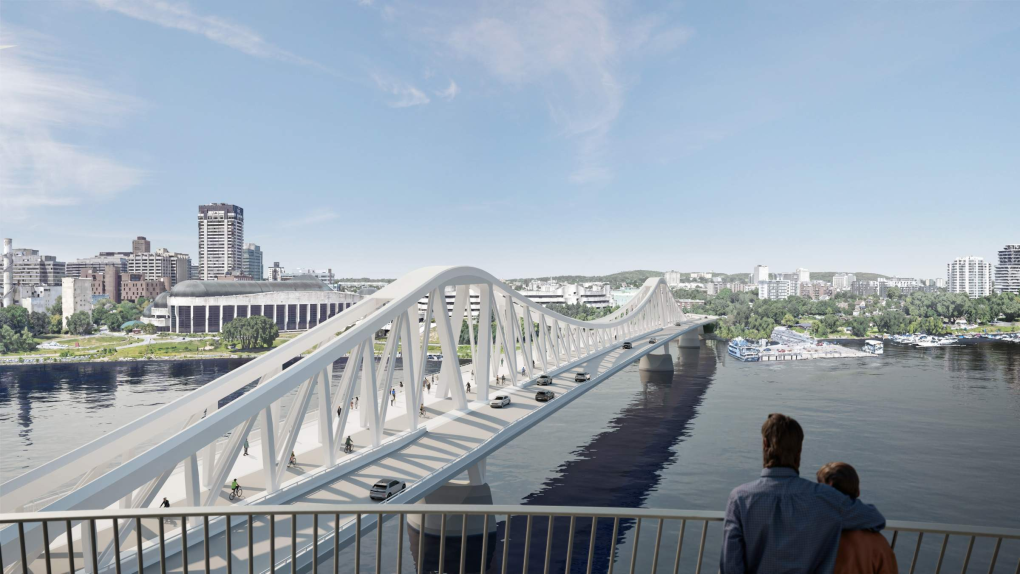 The NCC says the Echo design is a reinterpretation of the existing Alexandra Bridge. (NCC-PSPC/website)
The NCC says the Echo design is a reinterpretation of the existing Alexandra Bridge. (NCC-PSPC/website)
"This is the reinterpretation of the existing historic structure," said Martin Knight, chief architect for the design team. "It is not a replica."
The Echo bridge concept combines heritage with modern design, with two "V" piers and a refined twin-structural truss. It will have a 210 metre main span with a distinctive silhouette featuring two primary support piers and a "twin plane of structures through which the bike lane passes."
"The design combines visual references to the historic truss structure, including a distinctive silhouette with two primary support piers, and a twin plane of structures through which the bike lane passes," the NCC website says.
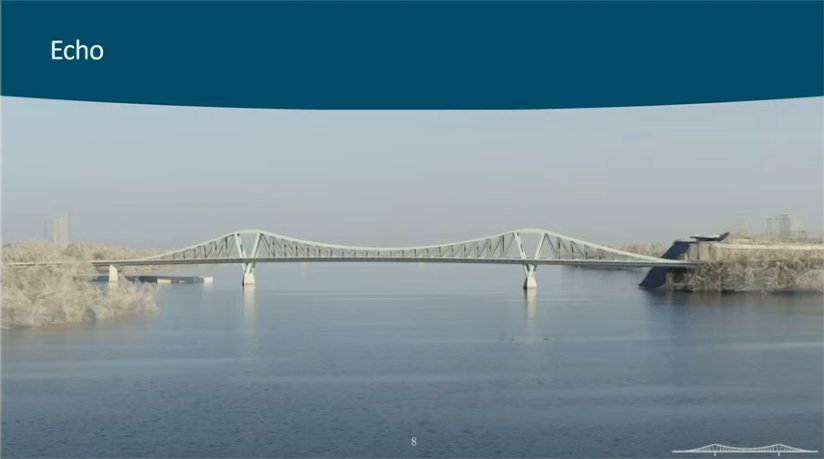 Echo is one of three proposed design concepts for the new interprovincial bridge over the Ottawa River. (NCC-PSPC/presentation)
Echo is one of three proposed design concepts for the new interprovincial bridge over the Ottawa River. (NCC-PSPC/presentation)
The design has a three-part deck arrangement, with spaces for vehicles, cyclists and pedestrians. Public spaces will be marked with the twin high points of the structure, enhanced with seating and seasonal canopies. Staff say the bridge includes a pedestrian deck and a public space on the upstream side.
"Indigenous expressions are woven throughout, from the base of the 'V' piers shaped to resemble canoe prows to the timber compression members between the top chords evoking a canoe's yoke, celebrating the sense of place and encouraging reflection about the meaning of the river and the bridge," the report says. Staff say the pedestrian deck may feature timber elements to pay homage to the wooden boardwalk of the Alexandra Bridge.
The Echo bridge would stand three metres taller than the existing Alexandra Bridge.
 The Echo design concept has a three-part deck arrangement, with spaces for vehicles, cyclists and pedestrians. (NCC-PSPC/presentation)
The Echo design concept has a three-part deck arrangement, with spaces for vehicles, cyclists and pedestrians. (NCC-PSPC/presentation)
Rendez vous
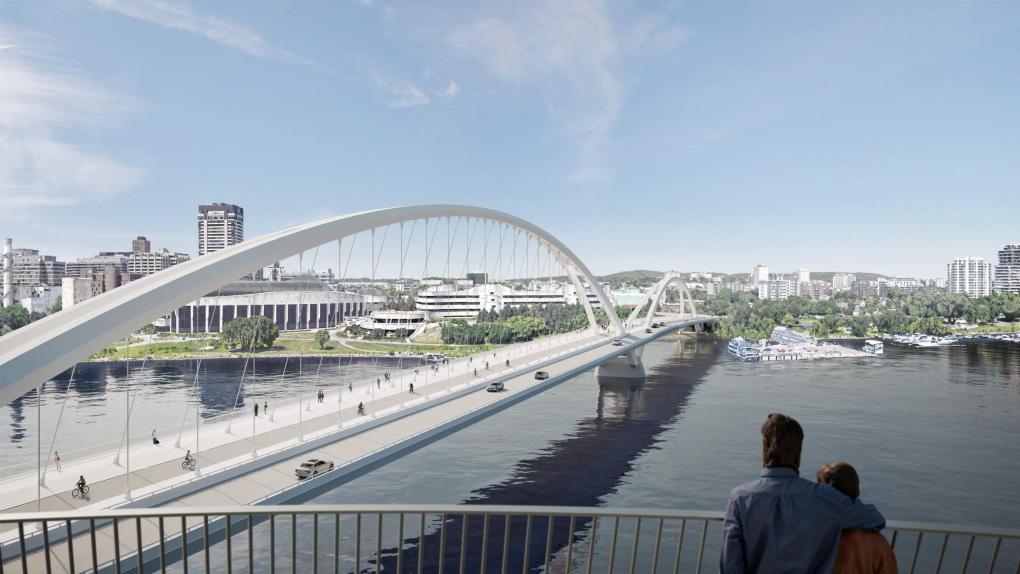 The NCC says the Rendez vous design concept was developed to strengthen the concept of a meeting place. "The two arches lead to a singular gathering place over the river." (NCC-PSPC/website)
The NCC says the Rendez vous design concept was developed to strengthen the concept of a meeting place. "The two arches lead to a singular gathering place over the river." (NCC-PSPC/website)
The second design concept is called Rendez vous, which is a pair of "grand arches whose spans are 290 metres and 220 metres meeting at a single pier in the river."
"This concept highlights the river as the defining environmental and social component of the landscape," says the NCC's submission. "It appears to step lightly in the Ottawa River (Kichi Zībī) with a pair of graceful arches meeting at water level, acknowledging the river's importance to the Algonquin Nations and defining a collective Vision to create a bridge and urban landscape as a 'Place of Exchange', a gathering place which reflects the origins of Adawe (Ottawa) which in Anishinabe language translates as 'to trade.'"
 The Rendez vous design is one of three design concepts proposed to replace the Alexandra Bridge over the Ottawa River. (NCC-PSPC/presentation)
The Rendez vous design is one of three design concepts proposed to replace the Alexandra Bridge over the Ottawa River. (NCC-PSPC/presentation)
The bridge will include a pedestrian pathway, cycleway and roadway. Staff say the twin arches will create a public space for gatherings.
"On special occasions, the roadway can be closed to vehicles, transforming the space into a vibrant hub for civic celebrations," staff say.
The NCC says the vision for the Rendez vous concept was developed to strengthen the concept of a meeting place.
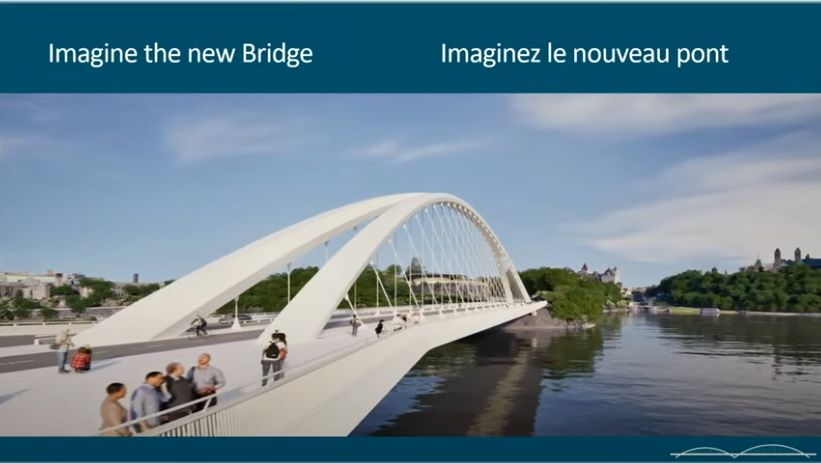 Staff say the Rendez vous design concept will include spaces for vehicles, pedestrians and cyclists. (NCC-PSPC/presentation)
Staff say the Rendez vous design concept will include spaces for vehicles, pedestrians and cyclists. (NCC-PSPC/presentation)
Motion
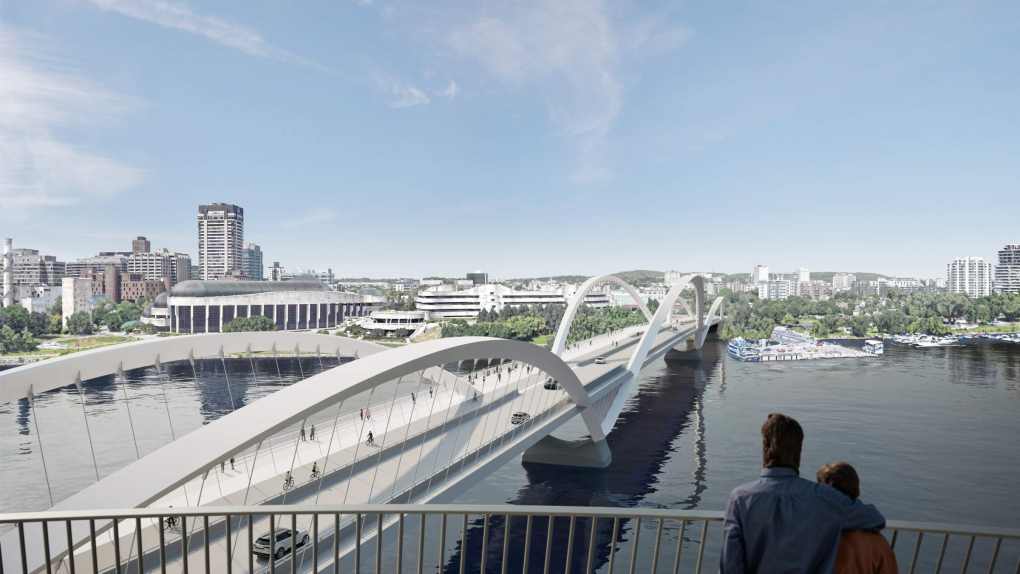 The NCC says Motion design is inspired by the eel, which is native to the Ottawa River. "Three arches rise and fall offering interest both above and below." (NCC-PSPC/website)
The NCC says Motion design is inspired by the eel, which is native to the Ottawa River. "Three arches rise and fall offering interest both above and below." (NCC-PSPC/website)
The third design concept is Motion, with staff saying it is a "tribute to the dynamic, ever-changing movement of the river."
The design is inspired by the American Eel, "the bridge's graceful form reflects the eel's fluid motion and honours late Algonquin Elder Chief Willima Commanda's dedication to restoring this delicate ecosystem." The three arches, one primary arch and two secondary arches, "rise and fall, flowing over the river."
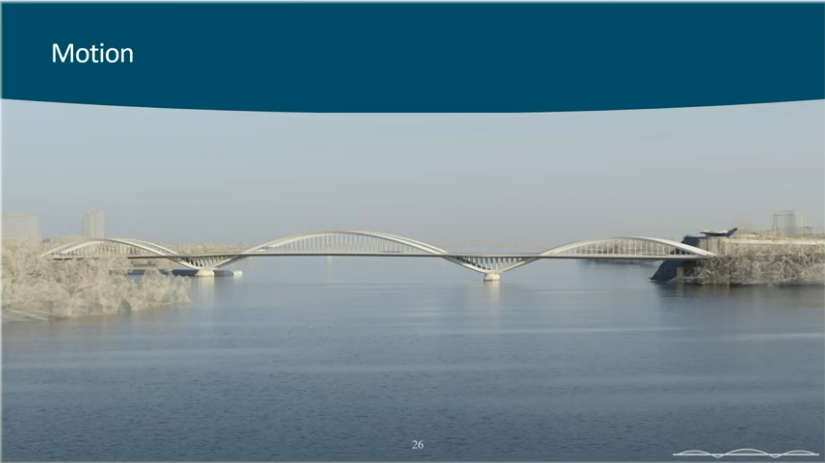 The Motion design is one of three design concepts unveiled for the new interprovincial bridge over the Ottawa River. (NCC-PSPC/presentation)
The Motion design is one of three design concepts unveiled for the new interprovincial bridge over the Ottawa River. (NCC-PSPC/presentation)
"The architectural approach effortlessly blends with its surroundings, weaving a harmonious tapestry of land, water, and sky," says the submission to the NCC.
"On a straight plan alignment, like the Alexandra Bridge, the Ottawa side of the bridge is fixed, while the Gatineau side offers flexibility due to its setback from the river, allowing for a safer and more aesthetically pleasing approach."
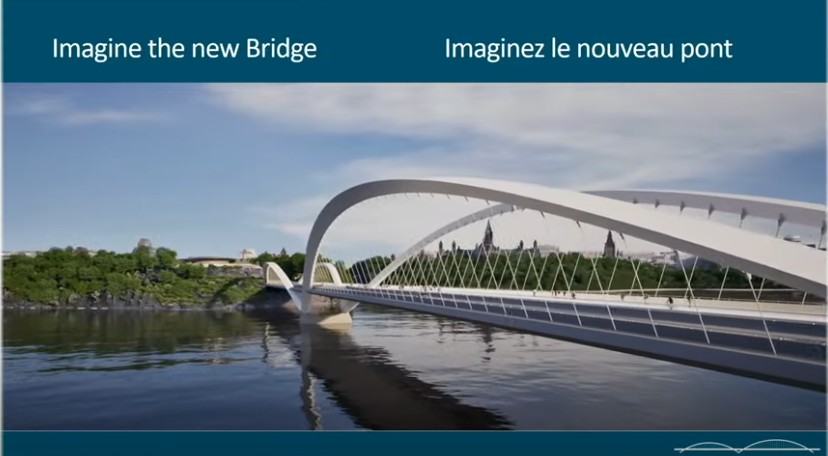 A look at the Motion design concept for the new interprovincial bridge over the Ottawa River. (NCC-PSPC/presentation)
A look at the Motion design concept for the new interprovincial bridge over the Ottawa River. (NCC-PSPC/presentation)
The proposal for the Motion concept has a cycleway, roadway and pedestrian area.
"The twin planes of outward-leaning, unbraced arches create a generous 'street' for vehicular and cycle routes, while offering pedestrians a more intimate journey."
Public open houses
The National Capital Commission and Public Services and Procurement Canada will be hosting two public open houses, and an online survey is active until Oct. 24.
Wednesday's open house will be held at the Canadian Museum of History in Gatineau from 4 p.m. to 9 p.m.
On Thursday, an open house will be held at the Shaw Centre on Colonel By Drive from 4 p.m. to 9 p.m.
Staff say the public consultations will be used to gather feedback on the three design concepts and help inform the selection of the final concept.
The NCC's Board of Directors is scheduled to approve the final concept next spring, with a recommendation of the 100 per cent developed design set for 2028. The deconstruction of the existing Alexandra Bridge and the construction of the new bridge is set for between 2028 and 2032.
The Alexandra Bridge, built in 1901, is currently closed to vehicles, and is expected to reopen in February 2025.
CTVNews.ca Top Stories

Trudeau noncommittal on expanding rebate beyond 'working Canadians'
Prime Minister Justin Trudeau does not appear willing to budge on his plan to send a $250 rebate to 'hardworking Canadians,' despite pressure from the opposition to give the money to seniors and people who are not able to work.
'Mayday!': New details emerge after Boeing plane makes emergency landing at Mirabel airport
New details suggest that there were communication issues between the pilots of a charter flight and the control tower at Montreal's Mirabel airport when a Boeing 737 made an emergency landing on Wednesday.
Cucumbers sold in Ontario, other provinces recalled over possible salmonella contamination
A U.S. company is recalling cucumbers sold in Ontario and other Canadian provinces due to possible salmonella contamination.
Latest updates: Tracking RSV, influenza, COVID-19 in Canada
As the country heads into the worst time of year for respiratory infections, the Canadian respiratory virus surveillance report tracks how prevalent certain viruses are each week and how the trends are changing week to week.
Weekend weather: Parts of Canada could see up to 50 centimetres of snow, wind chills of -40
Winter is less than a month away, but parts of Canada are already projected to see winter-like weather.
W5 Investigates A 'ticking time bomb': Inside Syria's toughest prison holding accused high-ranking ISIS members
In the last of a three-part investigation, W5's Avery Haines was given rare access to a Syrian prison, where thousands of accused high-ranking ISIS members are being held.
Federal government posts $13B deficit in first half of the fiscal year
The Finance Department says the federal deficit was $13 billion between April and September.
Armed men in speedboats make off with women and children when a migrants' dinghy deflates off Libya
Armed men in two speedboats took off with women and children after a rubber dinghy carrying some 112 migrants seeking to cross the Mediterranean Sea started deflating off Libya's coast, a humanitarian aid group said Friday.
Nick Cannon says he's seeking help for narcissistic personality disorder
Nick Cannon has spoken out about his recent diagnosis of narcissistic personality disorder, saying 'I need help.'

































